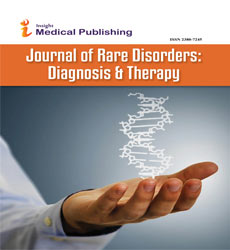Cushing's Syndrome: Causes, Symptoms, Diagnosis, and Treatment
Gul Ilhan
Department of Neuroradiology, Pitie-Salpetriere University Paris, France
DOI10.36648/2380-7245.10.1.152
Gul Ilhan*
Department of Neuroradiology, Pitie-Salpetriere University, Paris, France
- *Corresponding Author:
- Gul Ilhan
Department of Neuroradiology,
Pitie-Salpetriere University, Paris,
France,
E-mail: gulilhan@gmail.com
Received date: January 30, 2024, Manuscript No. IPRDDT-24-18722; Editor assigned date: February 01, 2024, PreQC No. IPRDDT-24-18722 (PQ); Reviewed date: February 13, 2024, QC No. IPRDDT-24-18722; Revised date: February 19, 2024, Manuscript No. IPRDDT-24-18722 (R); Published date: February 26, 2024, DOI: 10.36648/2380-7245.10.1.152
Citation: Ilhan G (2024) Understanding the Complexities of Cushing's Syndrome. J Rare Disord Diagn Ther Vol.10 No.1:152.
Description
Cushing's syndrome, also known as hypercortisolism, is a rare but serious endocrine disorder characterized by excessive levels of cortisol in the body. American neurosurgeon Harvey Cushing, who first described the condition in 1932, Cushing's syndrome can arise from various causes, leading to a myriad of symptoms that can significantly impact an individual's health and quality of life. In this article, we will delve into the causes, symptoms, diagnosis, and treatment options for Cushing's syndrome. Cushing's syndrome can be caused by several factors, all of which result in the body being exposed to high levels of cortisol over an extended period. The most common cause is the prolonged use of corticosteroid medications such as prednisone for treating conditions like asthma, rheumatoid arthritis, or lupus. These medications mimic the action of cortisol and can lead to adrenal gland suppression. Another cause of Cushing's syndrome is the overproduction of cortisol by the adrenal glands themselves. This can be due to adrenal tumors, either benign (adenomas) or malignant (adrenocortical carcinoma), which produce excess cortisol independent of the body's normal regulatory mechanisms. In some cases, excessive production of adrenocorticotropic hormone by the pituitary gland, often as a result of a pituitary tumor can stimulate the adrenal glands to produce more cortisol than necessary. Less commonly, ectopic ACTH-producing tumors, which are tumors located outside the pituitary or adrenal glands (such as in the lungs or pancreas), can cause Cushing's Syndrome by secreting ACTH inappropriately. The symptoms of Cushing's syndrome can vary widely and may develop gradually over time. Some weight gain, particularly in the face upper back (buffalo hump), and abdomen, often accompanied by thin arms and legs.
Muscle weakness and fatigue
Skin changes, including thinning, bruising easily, stretch marks that are purple or pink in color, and slow wound healing. Women may experience irregular menstrual periods and excess facial hair (hirsutism), while men may have decreased libido and erectile dysfunction. It's important to note that not all individuals with Cushing's Syndrome will experience all of these symptoms, and the severity can vary depending on the underlying cause and individual factors. Diagnosing Cushing's Syndrome can be challenging due to its diverse array of symptoms, which can overlap with other conditions. A comprehensive evaluation typically involves several steps, including: A healthcare provider will review the patient's medical history, symptoms, and conduct a physical examination to look for characteristic signs such as weight gain and changes in skin appearance. Blood and urine tests can measure cortisol levels and evaluate other hormones involved in the body's stress response. These tests may include the dexamethasone suppression test, 24-hour urinary free cortisol test, and ACTH levels. Imaging tests such as CT scans and MRI scans may be used to visualize the adrenal glands, pituitary gland, and other structures in the body to identify any tumors or abnormalities. In some cases, additional tests, such as the highdose dexamethasone suppression test or petrosal sinus sampling, may be necessary to differentiate between different causes of Cushing's syndrome, particularly if Cushing's disease is suspected.
Treatment options for cushing's syndrome
The appropriate treatment for Cushing's syndrome depends on the underlying cause and severity of the condition. Treatment goals typically focus on reducing cortisol levels, alleviating symptoms, and addressing any complications. If Cushing's syndrome is caused by the prolonged use of corticosteroid medications, gradually tapering and discontinuing these medications under medical supervision may help alleviate symptoms. Surgical removal of adrenal tumors, pituitary tumors or ectopic ACTH-secreting tumors may be necessary to normalize cortisol levels. Surgery carries risks, and the choice of procedure depends on the location and nature of the tumor. In cases where surgery is not possible or effective, radiation therapy may be used to shrink or destroy tumors, particularly in Cushing's disease. In some cases, medications such as ketoconazole, metyrapone, or pasireotide may be prescribed to inhibit cortisol production or block its action in the body. Pituitary radiotherapy or bilateral adrenalectomy: These treatments are reserved for cases that are refractory to other interventions or in cases of severe Cushing's syndrome. Cushing's syndrome is a complex disorder with diverse causes and manifestations that can significantly impact an individual's health and well-being. Prompt diagnosis and appropriate treatment are essential for managing symptoms, preventing complications, and improving quality of life. With advances in medical imaging, hormone testing, and treatment modalities, healthcare providers can better identify and manage this challenging condition, ultimately improving outcomes for individuals affected by Cushing's Syndrome.
Open Access Journals
- Aquaculture & Veterinary Science
- Chemistry & Chemical Sciences
- Clinical Sciences
- Engineering
- General Science
- Genetics & Molecular Biology
- Health Care & Nursing
- Immunology & Microbiology
- Materials Science
- Mathematics & Physics
- Medical Sciences
- Neurology & Psychiatry
- Oncology & Cancer Science
- Pharmaceutical Sciences
